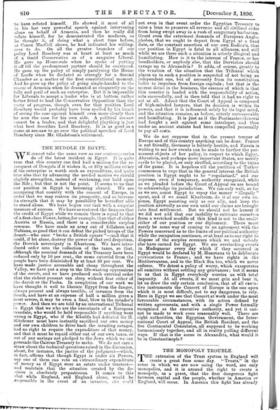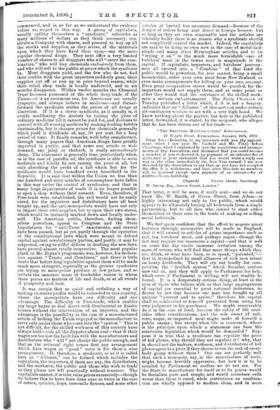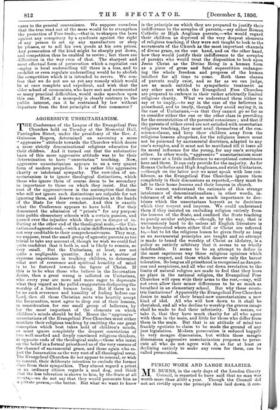THE MONOPOLY TROUBLE. T HE extension of the Trust system in
England will create a great fuss some day. " Trusts," i3 the sense in which we are now using the word, are only monopolies, and it is around the right to create a monopoly, as a pivot, that the first dangerous fight between capital and the people, whether in America or England, will occur. In America this fight has already commenced, and is, so far as we understand the evidence before us, waged in this way. A group of capitalists, usually calling themselves a " syndicate," subscribe as many millions of dollars as they think necessary, con- stitute a Company with shares, and proceed to buy up all the stocks and supplies, as they arrive, of the materials upon which they have fixed their eyes,—say the more popular chemical drugs. They next offer a very limited number of shares to all druggists who will " enter the com- bination," who will buy chemicals exclusively from them, and who will sell to the public at prices which the syndicate fix. Most druggists yield, and the few who do not, find their credits with the great importers suddenly gone, their supplies cut off or run up in price beyond reason, while their retail shop trade is locally undersold, and in six months disappears. Within twelve months the Chemical Trust becomes possessed of the whole drug-trade of the Union—it is an enormous one, for Americans are usually dyspeptic, and always believe in medicine—ansl thence- forward the syndicate settles the prices of all drugs at discretion. If it is a clever syndicate, as it usually is, it avoids maddening the doctors by raising the price of ordinary medicine till it cannot be paid for, and declines to quarrel with all nursing mothers by making feeding-bottles unattainable, but it charges prices for chemicals generally which yield it dividends of, say, 30 per cent. for a long period of time. It finally remarks, with lofty complacency, through many papers that American drugs have greatly improved in purity, and that some one article in wide demand, say jalap or rhubarb, is really astonishingly cheap. The statement is generally true, particularly when, as in the case of paraffin oil, the syndicate is able to seem moderate and kindly by not raising the price at all, but only absorbing the profit of a fall which but for the syndicate would have benefited every household in the Republic. It is said that within the Union no less than one hundred and sixty articles of consumption have fallen in this way under the control of syndicates, and that in many large departments of trade it is no longer possible to open a shop without their consent. Even, therefore, if Free-trade were established, the evil would not be easily cured, for the importers and distributors have all been bought up, and the anti-monopolists would have not only to import their own supplies, but to open their own stores, which would be instantly marked down and locally under- sold. The American public, therefore, finding them- selves powerless, appeal to Congress and the State Legislatures for " anti-Trust " enactments, and several have been passed, but as yet, partly through the operation of the constitutional laws which were meant to defend capital against revolutionary parties, and partly, it may be suspected, owing to wilful defects in drafting the new laws, have proved almost totally inoperative. The most popular plank in Mr. Bryan's programme was, however, his declara- tion against "Trusts and Combines," and there is little doubt that before long legislation against them will be made much more stringent, especially as the greater syndicates are trying to monopolise produce at low prices, and so irritate the immense mass of freeholder voters to whom those prices are matters of life and death, or at all events of prosperity and ruin.
It was certain that so quick and unfailing a way of making excessive profits would be extended to this country, -where the monopolists have one difficulty and one advantage. The difficulty is Free-trade, which enables any large buyer to deal direct with Continental or Asiatic houses without the intervention of an importer, and the advantage is the possibility in the case of a manufactured article of bribing the Union engaged in the manufacture to serve only under those who come into the " system." This is not difficult, for the skilled workmen of this country have always held—vide all the disputes about coal—that if their wages are too low the fault lies with the manufacturers and distributors who " will " not charge the public enough, and that as the artisans' right comes first any arrangement which fixes wages at " good " rates is for them a wise arrangement. If, therefore, a syndicate, or as it is called here an "Alliance," can be formed which includes the capitalists, the importers, if there are any, the distributors, and the workmen, the public and those who wish to trade as they please are left practically without resource. The capitalists cannot, it is true,raise prices excessively—though we believe this to have been done once or twice in the case of cotton, quinine, hops, camomile flowers, and some other articles of limited but necessary demand—because of the danger of orders being sent direct to foreign houses ; but so long as they are even reasonable and the articles are tolerably bulky there is no reason why a syndicate should not completely control the market. Indeed, the capitalists are said to be doing so even now in the case of metal bed- steads and many other Birmingham articles, and to be- " trying it on " in the much more formidable case of butchers' meat in the towns next in magnitude to the capital. If capitalists, importers, and butchers' journey- men all entered into a " Combine " of that kind the public would be powerless, for you cannot, being a small householder, order your own meat from New Zealand, or even make arrangements for killing on your own account. Even great co-operative stores would be puzzled, for the importers would not supply them, and at some point or other they would find the resistance of the skilled work- men a serious embarrassment. The _Daily Chronicle of Tuesday published a letter which, if it is not a forgery, indicates that an " Alliance " of this sort can under certain circumstances venture to act with a very high hand. We know nothing about the parties, but here is the published letter, forwarded, it is stated, by the recipient, who alleges• that he has been driven out of his trade :— " TnE BEDSTEAD MANUFACTURERS' ASSOCIATION,
41 Temple Street, Birmingham, January 16th, 1895.
DEAR Sin,—Referring to my interview with you (by appoint. meat, when I saw your Mr. Pasfield and Mr. Pike) before. Christmas, when I explained to you the regulations and arrange- ments of this Association, and intimated that you could become, a member, if you so desired it, by payment of an entrance-fee of £250, and to your statement that you would write a reply one way or the other immediately the New Year turned, I am now directed by the Association to say that, as you have not accepted the offer, it is withdrawn; and that after this date no member, will be received except upon payment of an entrance-fee of £2,000.—Yours faithfully, (Signed) FRANK IMI'KY, Secretary.
W. SMITH, Esq., Green Street, London."
That letter, it will be seen, if really sent—and we do not know Mr. W. Smith, of Green Street, from Adam—is highly interesting not only to the public, which would. appear to be ultimately buying all bedsteads from a single partnership, but to all men who intend to start either themselves or their sons in the trade of making or selling metal bedsteads.
We feel qu:te confident that the effort to acquire great fortunes through monopolies will be made in England,. that it will extend to articles of prime importance such as salt, tea, butchers' meat, and perhaps sugar—though the last may require too enormous a capital—and that it will on some fine day excite immense irritation among the mass of voters, who will find that most things which they eat, drink, or wear have been, so to speak, " patented,"— that is, monopolised by small alliances of rich men intent on heavy dividends. They will cry out loudly for com- petition, the "devilish system" which Socialist orators now rail at, and they will apply to Parliament for help, which even if Parliament is willing, will not readily be found. It is a desperately serious thing, at least in the eyes of those who believe with us that large aggregations. of capital are essential to great national industries, to. decree by law that because one man has bought up all quinine " present and to arrive," therefore his capital shall be confiscated or himself prevented from using his own judgment in his purchases. We might conceivably do it in the case of food, because the safety of life over- rides other considerations, and the sole owner of salt, corn, sugar, or imported meat might make of himself a public enemy ; but except when life is concerned, where is the principle upon which a statesman can base the restrictive legislation which would be demanded ? Sup- pose it is true that a syndicate can regulate the price of kid gloves, why should they not regulate it ? why, that is, should not the makers, workmen, and distributors of kid. gloves agree to a price if they choose to run the risk of every- body. going without them ? One can see perfectly well that such a monopoly, say, in the manufacture of tools,. might become horribly oppressive, but how it is to be assailed by Parliament we confess we do not see. For the State to manufacture for itself or to fix prices would be Socialism pure and simple, and would introduce evils worse than those it cured, while restrictions on combina- tion are wholly opposed to modern ideas, and in most. cases to the general convenience. We suppose ourselves that the true road out of the mess would be to strengthen the protection of Free-trade,—that is, to sharpen the laws against any conspiracy by a syndicate against the right of any person to set up any manufacture or shop he pleases, or to sell his own goods at his own prices. Any persecution of the kind might be sharply put down, and competition thus be enabled to revive ; but there are difficulties in the way even of that. The sharpest and most effectual form of persecution which a capitalist can employ is local underselling till there is a loss, and to prohibit or even regulate underselling would be to abolish the competition which it is intended to revive. We con- fess that we do not see as yet any remedy which would be at once complete and expedient, and wish that the older school of economists, who have met and surmounted so many practical difficulties, would make speeches upon this one. How, if a monopoly is clearly contrary to the public interest, can it be restrained by law without departure from the first principles of free commerce ?
























































 Previous page
Previous page